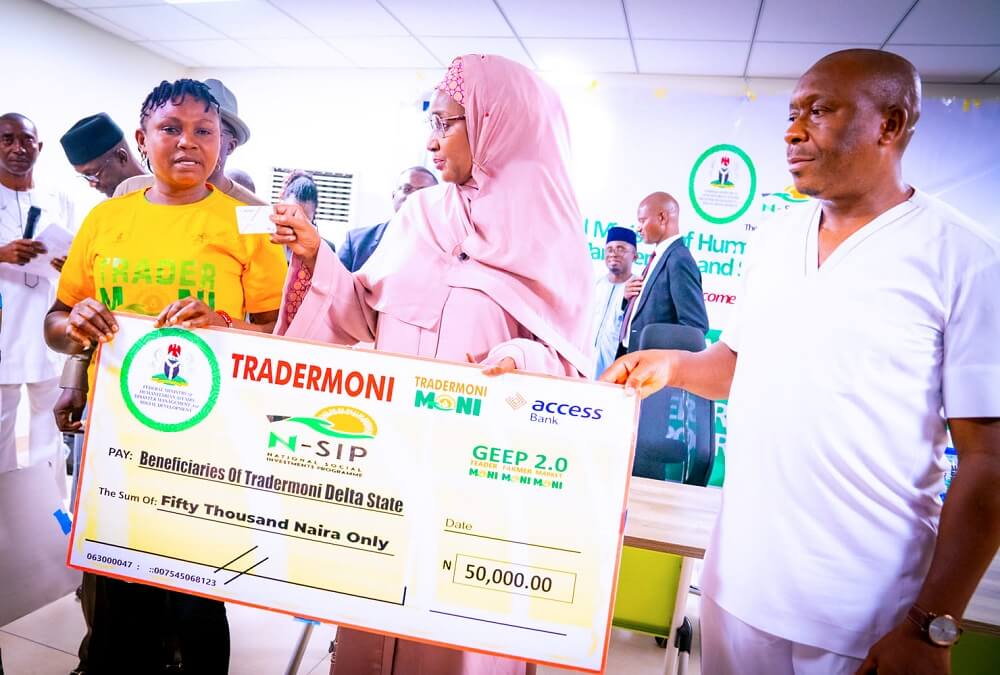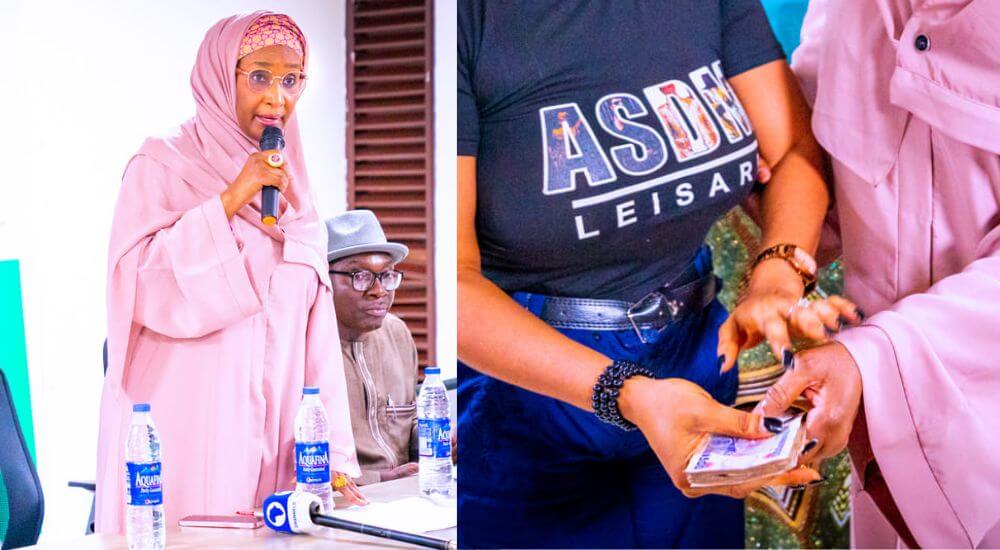TraderMoni: FG Begins Cash Disbursement Of N20,000, N50,000 Each To ‘Vulnerable’ Nigerians
The Federal Government on Wednesday commenced payment of between N20,000 and N50,000 as grants and loans to 5,485 “vulnerable” youths and women under the TraderMoni and MarketMoni schemes of its Government Enterprise and Empowerment Programme (GEEP).
Sadiya Farouq, the Minister of Humanitarian Affairs, Disaster Management and Social Development, announced that the payments will commence today in Delta and Bayelsa States.
Advertisement
The minister was in both states on Wednesday to flag off the payments and empathize with the people over the recent flooding in the states.
In Delta, she said “The GVG (Grant for Vulnerable Groups) programme is designed to provide a one-off cash grant of N20,000.00 to the poorest and most vulnerable Nigerians in rural and peri-urban areas across the 36 States of the Federation and the Federal Capital Territory. Our target in Delta State is to disburse the grant to about 3,000 beneficiaries across the 25 Local Government Areas in the State. It is worthy to note that 70% of these beneficiaries must be women, while the remaining 30% is for youths. Mr. President has further directed that, at least 15% of the total number of beneficiaries must specifically be allocated to citizens with special needs, including Persons with Disability (PWDs), internally displaced persons and senior citizens in the State.”
Under the GEEP programme, Farouq said the TraderMoni loan of N50,000.00 will target “under-privileged and marginalized youths in Nigeria aged between 18 and 40 years” while the MarketMoni loan of N50,000.00 will be “given to under-privileged and marginalized women in the society with a special focus on female-headed households” and FarmerMoni loan of N300,000.00 will be released to rural farmers.
“Let me also state that under the first phase of GEEP 2.0, a total of 33,838 potential beneficiaries were registered across 28 LGAs in Delta State after which 11,991 were verified and 4,754 were enumerated. The total number of 4,657 beneficiaries were finally selected to receive disbursement. The selected beneficiaries have undergone enumeration and today we have come to roll-out the programme in the Delta State. Hence, successful beneficiaries of the GEEP proagramme will start receiving credit alert from Access bank from today by God’s grace.
Advertisement
The minister further stated that President Muhammadu Buhari had approved the release of “12,000 metric tons of assorted food commodities from National Strategic Reserve for distribution to victims of this flood disaster in the country as a way of assuaging their suffering. Out of this, 105 metric tons of maize, 88.7 metric tons of sorghum and 98.7 metric tons of garri are to be distributed to the victims of flood disaster in the State.”
In Bayelsa, Farouq said about 828 beneficiaries out of 8,762 that registered were selected to benefit from the programmes.
VOTE BUYING ALLEGATION
The disbursements are coming about three months before the 2023 general election.

Advertisement
In 2019, Transparency International questioned the timing of similar interventions by the Federal Government.
The global movement which aims to end injustice and corruption across the world described the government’s collateral-free loan initiative targeted at petty traders and artisans under the National Social Investment Programme as a form of voter inducement.
Ahead of the 2019 election, the Buhari administration had disbursed loans of N10,00 to traders across the country under TraderMoni scheme.
The Head of Transparency International (Nigeria), Auwal Musa Rafsanjani, had during a Channels TV interview noted that the initiative was an “official use of public funds in the name of TraderMoni to actually induce voters.”
According to him, “It was not done three years ago. It was only started close to election time. So, the allegation by many Nigerians that this is clearly a case of vote buying using public funds goes contrary to our constitution and to have a free and fair election.
“That is why the Independent National Electoral Commission itself has seen this danger. The vote buying we are seeing has transformed to have more official recognition through the acts that unfortunately we are seeing performed by some of the agencies using public funds.”



